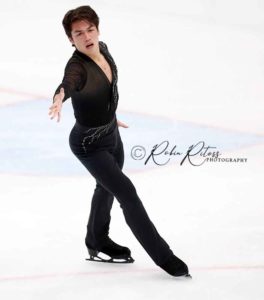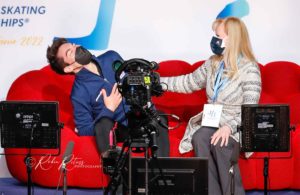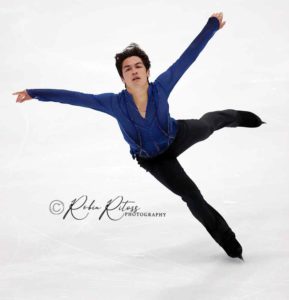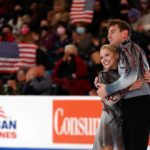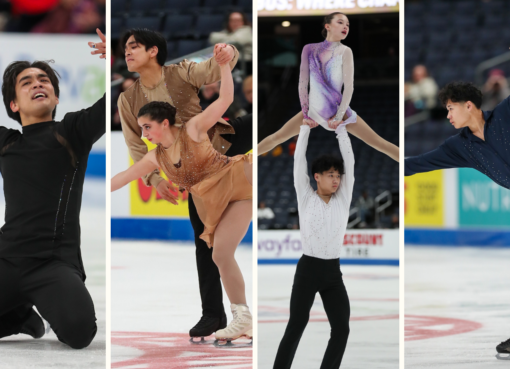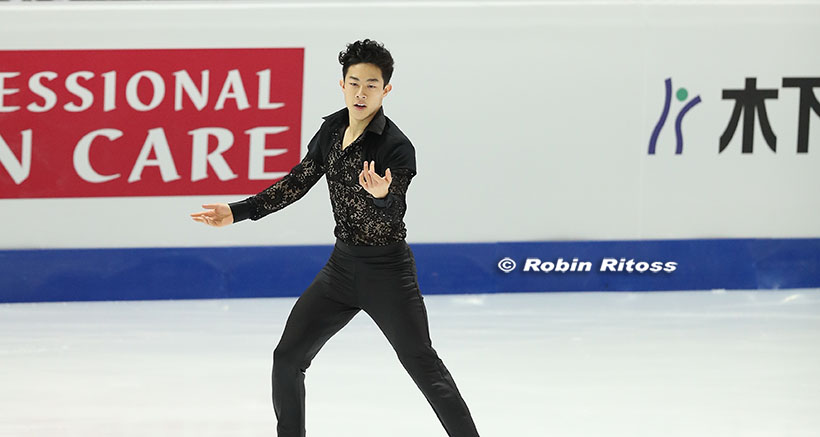By Sean Conlon, Team FSO staff writer
Photos by Robin Ritoss and Camden Pulkinen
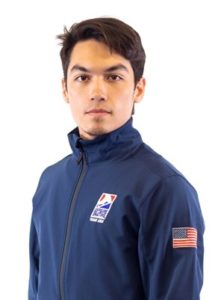 After a fifth-place finish at his first World Championships last season, placing third in the free skate a day after his birthday to earn the small bronze medal, Camden Pulkinen was building momentum heading into next season. And last month — just three months after switching from his coaches of three seasons, Tammy Gambill and Damon Allen, to Rafael Arutunian and Alex Johnson — he continued riding that wave, opening his season at the U.S. International Figure Skating Classic in Lake Placid, NY with another third place finish — this time overall.
After a fifth-place finish at his first World Championships last season, placing third in the free skate a day after his birthday to earn the small bronze medal, Camden Pulkinen was building momentum heading into next season. And last month — just three months after switching from his coaches of three seasons, Tammy Gambill and Damon Allen, to Rafael Arutunian and Alex Johnson — he continued riding that wave, opening his season at the U.S. International Figure Skating Classic in Lake Placid, NY with another third place finish — this time overall.
But as the season comes into full swing, the 22-year-old is now learning how to manage his new training environment with an even newer academic setting: Columbia University. For him, it was other figure skaters who competed while enduring the rigors of higher education that inspired him to do the same.
Figure Skaters Online’s Sean Conlon, who is also a student at Columbia University, had the opportunity to sit down for a chat with Pulkinen about training and his approach to the upcoming season ahead of Skate Canada — his first Grand Prix event. He also talked about his first experience at Worlds last season and life at Columbia.
FSO: What was it like to compete at the U.S. Classic this year, and how do you feel about your results?
Pulkinen: Lake Placid was a blast, honestly. I think it still feels like just yesterday I was competing at Worlds, but, you know, time moves forward. So, going into the next season with a strong finish, for me, was something I was happy to come away with from Lake Placid. It was actually, I think, the most I felt prepared for my first competition of the season out of any season I’ve ever done in my career that I can think of. So, it’s really nice. Even at Champs Camp, I had a pretty good showing and delivered what I wanted to. I’m feeling like the intention behind what I’m doing with the competitions that I’m entering is ever so prevalent. I’m kind of thinking about the competitions as a stake in the ground, and then formatting my training around the competitions rather than vice versa — just training, and then saying, ‘Oh, there’s a competition.’ This may be a backward mindset to me right now, but I think it’s showing in the results and showing a little more in my consistency that this is the way I need to start training.
FSO: With regard to your different training mentality, what was your mindset like in previous seasons?
Pulkinen: I think that sometimes in the past I’ve just trained with no rhyme or reason, but without the periodization of a competition maybe in a month. And finding those details within the day-to-day training of how many programs you’re doing, how many run-throughs and sections, that is really starting to show where you may want to build up a little more towards the competition, and then the week before, having a little bit of a deload so that your body can rest. You can’t move a competition, but you can change how you train around that competition. So, that’s what Alex Johnson and I are starting to really focus on, and that’s starting to show.
FSO: How has this influenced your perspective going into your upcoming Grand Prix events?
Pulkinen: I think that really trying to capitalize on the strides I’ve made over summer and maintaining my physical shape, my consistency, my program run-throughs, that’s really where we’re looking towards right now. I don’t think it’s truly a matter of trying to progress more in the black and white sense of technique, but it’s more of a maintenance thing. I need to maintain my endurance, my cardio, my technique, all those things are little details I think are going to really show in dividends. Over the next few months leading into these next Grand Prix events, that’s really what we’re looking for.
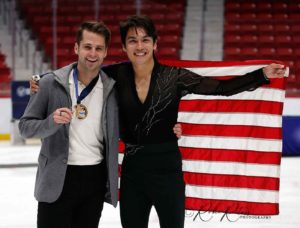 FSO: Tell me more about your coaching relationship with Alex. How has the collaborative dynamic allowed you to balance your workload at Columbia?
FSO: Tell me more about your coaching relationship with Alex. How has the collaborative dynamic allowed you to balance your workload at Columbia?
Pulkinen: You know, I really like working with Alex here in New York, because he’s gone through what I’m going through with taking a full-time course load and trying to compete at the highest level. I think sometimes he provides insight that I maybe wouldn’t have been able to see if I didn’t have him. So, he’s definitely helping me become more proactive rather than reactive towards some of the hurdles and challenges that I face. Competing at U.S. Classic, it was my first week in school, and I don’t think I anticipated how much the workload would be taxing on my mind and, honestly, body sometimes. But, he has definitely prepared me for that, and he’s a little more on the conservative side where he gives me a little more leverage to, I think, be in control of my training in addition to school. He knows that on some days, it’s just going to be a push, and it’s not going to be perfect. I think sometimes I expect perfection out of myself, and he really grounds me and takes me back to a perspective of, ‘Okay, you have to checkmark the box and just get through today.’ And I really appreciate that. School has been difficult. You know, I talked to a really great friend of mine, and he told me that this semester at Columbia, for some reason, is the hardest out of any semester he’s taken. So, I think just to elaborate on his words is that I think this semester is difficult for all Columbia students, not just me. But, definitely adding in the goal of making the Olympics in four years holds another level of stress to my life.
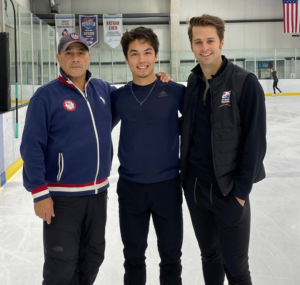 FSO: So, given that Alex is physically present when coaching you, how exactly do you fit Rafael into your day-to-day training?
FSO: So, given that Alex is physically present when coaching you, how exactly do you fit Rafael into your day-to-day training?
Pulkinen: I think that we’re just trying to echo all of Raf’s techniques that he’s taught me. I think that obviously you can tell with Nathan (Chen) that he’s created a very sound and stable technique. So, making frequent trips out to Irvine is something I’m capitalizing on to further my training. It’s interesting, because I feel like I have Alex in the driver’s seat but Raf in the passenger seat: Alex really directs the training, but then Rafael is like the guide and tells us what we need. He’s more of a consultant, in some ways, that provides me with the right technique, and Alex just trains that technique into me. It’s really cool to have two working parts of it instead of sometimes in the past where I’ve just had one person managing my whole career, whether that be training, competitions, technique. It’s really nice to have someone whose specific job is to train me and someone’s specific job is to provide me technique. That oscillation between both is really fun.
FSO: How do you think that stress has impacted you? Has it led you to place more of an emphasis on your day-to-day training to be successful at competition, or do you think it has removed some pressure by serving as a distraction from your schoolwork in some way?
Pulkinen: I think pressure is always present, but in my case, I feel fortunate that, actually, when I go out and compete now, even at Champs Camp or at the U.S. Classic, I have this thought in my head that regardless of what happens in the program, I can’t change what’s going to happen because I’ve already done the training and that no matter what, I still have to go home and do my assignment, whether it’s writing that essay or reading 300 pages of Plato. Those things are still going to be there whether I skate a perfect clean program or I skate a terrible program, or somewhere in the middle. So, it allows me to skate a little freer, and that feeling is honestly one of the best feelings.
FSO: How have the experiences of other top skaters managing their training with higher education prepared you for doing so once at Columbia?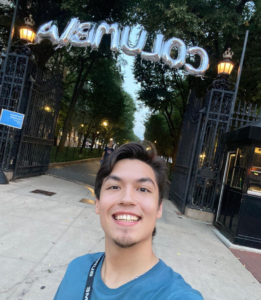
Pulkinen: What they really proved to me is that it’s possible. While no one has really created the perfect formula yet to both go into an elite institution and compete at the highest level, I think that they kind of paved the way for me to do this. It proves that it’s possible, and I really would like this to be the new norm, not having to sacrifice one’s entire professional career for skating. Honestly, it’d be really cool if skating could be recognized as an NCAA sport, but I know that’s a far reach. All these pioneers that go to school and skate, it’s inspirational. I think that we’re young right now, so maybe it’s a little bit of being naïve, but I think we’re all overachievers in the sense that we want to do everything at once.
FSO: Do you have any tips or insights they’ve given you that you’ve still held on to today?
Pulkinen: I think the biggest tip that I’ve ever been given from any of them or some of my peers is just to tap into the oscillation between skating and school. I think that when I’m in the classroom, I really have to key into the fact that I am a student in that moment, and I’m learning about accounting, or I’m learning about science. Whatever it is, that’s what I’m doing in the moment. As soon as I leave the Columbia gates, I am now in the city, and I am Camden, the skater. I think it’s about treating those two as separate entities, kind of like a Hannah Montana lifestyle where I put on the wig, and then I’m a skater, then I take off the wig, and now I’m a student. It sounds silly, but that’s really how I’ve been treating it. I have two separate lives, and they make me who I am. When I’m on the ice, I’m focusing on my quad toe, I’m not focusing on the textbook I have to read tonight. And vice versa when I’m in the classroom, I’m not worried about technique, I’m focusing on my professor. So, I think that level-headedness and the structure and discipline that I’ve inherited from skating is really something that I can tap into in the school sense while, of course, keep it going in the skating sense. That’s just going to keep progressing along as I go through harder classes and as the training gets more rigorous throughout the season. The more I can tap into that, the more successful I will be.
FSO: Along with Columbia, in what ways have you acclimated to New York more generally?
Pulkinen: I think that New York is so fun to live here in your 20s. Luckily, I’ve made some really good friends that have been there for me. And we take little trips downtown sometimes or go to museums. So, I rely on my close friends. But, at the same time, I’m not trying to create a huge circle here. I think that just with all the things I have going on right now, I want to make friends, but I don’t want to become too distracted with a social life that I lose sight of what’s really important, which is my education or my skating. That being said, sometimes I do get recognized at school as ‘that skater guy.’ One time someone said, ‘Hey, it’s Nathan Chen.’ And I’m like, ‘Oh, that’s not me.’ So, it’s kind of funny, but it’s also very nice to kind of be able to camouflage and just disguise myself as a regular student and not be recognized as a skater. I think sometimes it’s something that I miss as just being a normal human and being known as more than just the skater that I am.
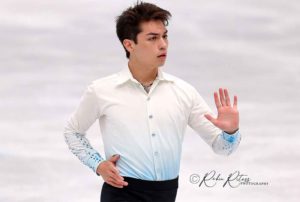 FSO: I want to shift gears now to your experience at Worlds last season. You found out the week before the event that you were going to compete. How did you mentally prepare for the competition?
FSO: I want to shift gears now to your experience at Worlds last season. You found out the week before the event that you were going to compete. How did you mentally prepare for the competition?
Pulkinen: I was always training, so it sucked from time to time, but I treated it like I was going to Worlds. Even though I knew that I wasn’t going, I still thought, ‘Okay, this is Worlds, I have to train for it.’ And, yes, in the back of my head, I knew I wasn’t going, but it got me through some of the tough programs that I was training being the alternate. So, it wasn’t really that much of a shock, because in my head, I think I made it up to be that I was already going despite me not knowing anything about going. When I found out, I don’t really think I had the time to even process it. I kind of just hopped on the flight, did my programs, and then went home. I don’t even really think the magnitude of what I did set in until the weeks afterwards. It was just such a blur to me and a beautiful blur at that. I think that it was special not just to go to my first Worlds and skate two clean programs, but also to celebrate my birthday. There was a lot of redemption at that competition with the previous Four Continents having somewhat of a disastrous result. There was a lot of redemption that led me to believe that I can do this, that I’m more than what I put out at Four Continents, and I can hang with some of the best in the world. So, it was a great experience. Those are the experiences we skate for, and I hope I can experience many, many, many more of those.
FSO: What was it like celebrating your birthday at Worlds, and did the event feel different from any other ISU event, seeing that it was both your first Worlds and your birthday?
Pulkinen: It was really fun to celebrate my birthday there, because even people I wouldn’t know just would say happy birthday, and that’s so special, just feeling like that day is specifically for you. It kind of takes me back to the 10-year-old Camden that would always anticipate his birthday, because he knew that everyone at school would say happy birthday, or they would sing him happy birthday at his favorite restaurant, Cheesecake Factory. You know, the little things may seem childish, but really, that moment kind of brought me back to it. So, that was fun. I also loved the audience in France. It was my first time competing in France, so that was kind of cool. But, honestly, it didn’t feel much different than any other event other than the writing on the wall saying it’s the World Championships, that’s the only thing that was different. I think that I’ve just competed so many times that, to me, ice is ice, and although there is this external pressure and stress behind a perceived higher level of competition like Worlds, I trained so hard last season that I was prepared for it. So, it was just a nice opportunity to get to perform my programs one last time and really share a part of me with everybody.
FSO: Your quadruple toe gave you a little bit of difficulty in the beginning of last season, but you seem to have really hit your stride with that jump. Did you change your approach to training to make it more consistent, and was it a matter of placing more of an emphasis on your technique and physical conditioning, or your mental training? Both?
Pulkinen: I think that I’ve always known I’ve been able to do it, but I think that I started to really get it consistent last season with the technique I was doing. Now, obviously going to Rafael and having a new approach to my training and the new approach to technique, it might take a little bit of a dip right now. But, building upon this new technique and putting in good habits for the quad toe is really what we’re going for now. Although it’d be great to have this season be my best season of my career, I really am trying to progress up for the next four years and have the Olympic season be my best season of my career, because I think that if I tried to do too much right now, then I may have regrets in the future in the sense that I’m not progressing to that. So, really having the long-term mindset rather than the short-term mindset of ‘this one season’ is important to me.
FSO: Any plans for more quads in the future?
Pulkinen: Back to this approach of four years rather than just year by year, I think that developing the proper technique for all the quads right now is what Rafael and I are going for. I will say I’ve had some success in the past with trying some quads, but I know that I really need to make some further changes to the technique of my triples in order to get a sound and consistent quad, because it’s one thing to be able to land a quad in competition once or twice, or maybe even three times, but I want my percentage of learning it to be near 100. I want to be consistent in that and have a sound technique. So, really looking at maybe not this year, but maybe next year or the year after, after I develop that consistent technique that I know I can do 10 out of 10 times, that’s what we’re looking for for these next quads.



